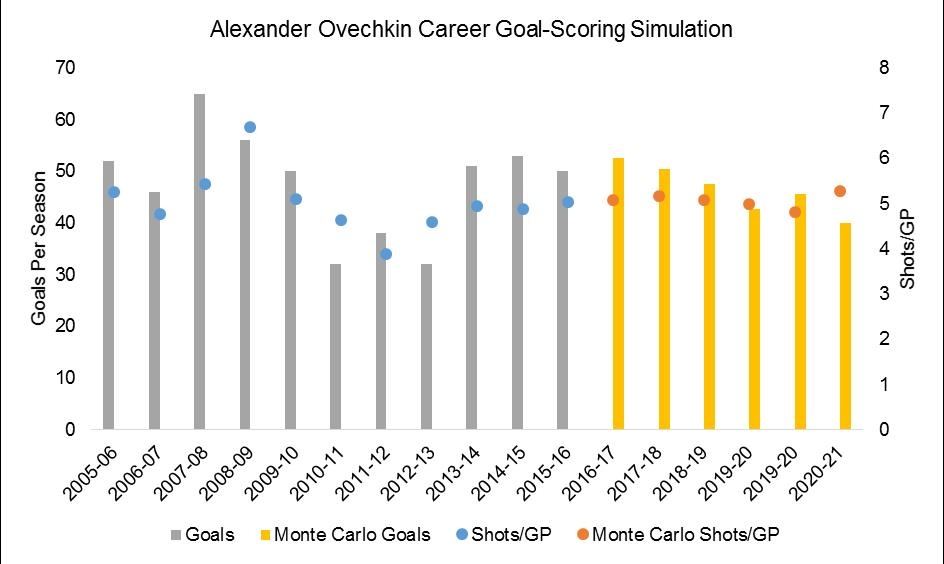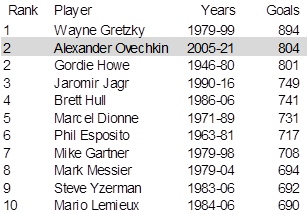Oct 11, 2016
Ovechkin in position to join goal-scoring greats
Travis Yost looks at where Washington Capitals sniper Alexander Ovechkin could end up on the NHL career goals list.
By Travis Yost
Ovechkin has won the award designated for the league’s top goal scorer six times in the last 10 years. Another way of looking at it: Ovechkin has more Rocket Richard wins than the entire field of hockey over the last decade, which is almost impossible to believe.
Even more impressive is the fact that we aren’t really seeing any drop in his goal-scoring capabilities as he ages. The theory was that Ovechkin was beginning to exit his prime during a tumultuous Washington Capitals coaching era from 2010-12, where he drifted from consistent 50-plus goal scorer to a skater who sat in the mid-30s by year end.
Evidently, what first appeared to be a legitimate and persistent drop-off turned was just a blip on the radar. Ovechkin rebounded for three consecutive 50-plus goal seasons since 2013, and has once again cemented his reputation as the league’s most dangerous offensive zone shooter.
The fact that Ovechkin’s still scoring at a brilliant pace into his 30s really does pose an interesting question about where he’ll land when his career is up. As it stands today, his 525 goals are 33rd all-time – and that ranking becomes significantly more impressive when you remember that many of the guys above him played in a hockey era where scoring was infinitely more prominent.
Regardless of environmental factors, I was curious about the future outlook for Ovechkin and, more specifically, how many players he could reasonably leapfrog on the all-time list before his career comes to a close.
We can come up with reasonable estimates so long as we are sold on the following assumptions: that his shot generation rates and conversion rates would persist in future seasons, that he’d likely see a slight drop in games played per season (he’s been as durable as anyone since entering the NHL), and that our most likely guess is that his NHL career likely won’t end before his contract expires in 2020-21.
With the information we have, we can simulate Ovechkin’s production over the next handful of seasons. Here’s how that looks:

You can see that the model still figures Ovechkin to be a prominent goal scorer, with his numbers sitting mid-to-low 40s for the next six seasons. It’s a step down from his excellence in past seasons, but this makes intuitive sense - it’s rare that a player in his 30s outpaces the same player in his 20s, so logically we should see a bit of a dive.
There are still an awful lot of goals there - 279 to be exact. Knowing Ovechkin’s current career goal total (525), we can realistically guess that Ovechkin could end up catching just about everyone.

Yes, it’s entirely possible that we are understating the drop in skill Ovechkin could experience in future years. But it’s just as possible that we are understating the number of seasons he will play before retirement (ending at the time of contract expiry would only take him to age 36), as well as the number of games we’d expect someone so incredibly durable to play in a given season.
My larger point here is that it is entirely fair - and perhaps the most probable outcome, save for some catastrophic injury - to guess that Ovechkin will surpass everyone above him not named Wayne Gretzky, meaning he’d retire as the second-best best goal scorer in the history of the sport.
More than anything, this is something to keep in mind when you’re watching the Washington Capitals this season. We aren’t just witnessing a fantastic goal scorer continue to rack up the scoring hardware. We are really witnessing one of the best to ever do it.

